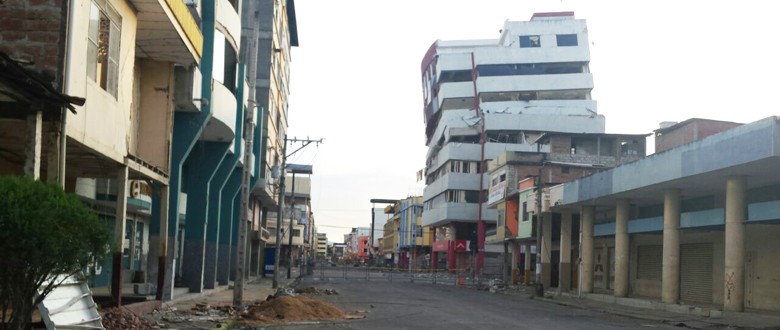
The earthquake that shook Ecuador mid-April has proved to be the most destructive the region has seen since Haiti in 2010. VVOB responded immediately, releasing additional funds but also redirecting existing development funding to mount an emergency education response together with the other members of the national Education Cluster. VVOB's unique contribution to the national Cluster is to specifically address the needs of adolescents affected by the disaster and to focus on restoring access to secondary technical education as quickly as possible. Applying the principle of “building back better” and making the crucial link between humanitarian aid and long-term development, VVOB argues that sufficient funds should be allocated for the immediate reactivation of quake-affected technical education infrastructure and training programmes with an aim to improve contents and delivery quality in the medium to long-term.
Quick action
The Education Cluster launched its emergency response just over two weeks after the disaster struck. It runs in three phases: a first phase where the focus is on providing socio-emotional support and leisure activities; a second in which non-formal education is supplied and the reactivation of formal education is prepared; and a third phase of formal education with an adjusted curriculum. The preparedness of the Ecuadorian Ministry of Education greatly augmented the response time, as a culturally appropriate emergency curriculum was available for print and dissemination. In addition to supporting this action, VVOB is ensuring in-service training in "restorative practices" for 250 student counsellors and teachers of technical education and the provision of mobile equipment to a maximum number of technical schools.
Adolescents need developmentally appropriate response
The post-disaster reactions of adolescents are known to be more adult-like than those of younger children. They tend to show post-earthquake fears, impaired identity formation, a foreshortened and pessimistic sense of future, antisocial behaviours such as vandalism and truancy, depression, anxiety, belligerence, school-related problems and interpersonal difficulties. To ensure a developmentally appropriate response, VVOB is collaborating with the Lima-based Latin American affiliate of the International Institute of Restorative Practices (IIRP) to equip 250 student counsellors and teachers of technical education with competencies to create a safe environment in which their students can express and share emotions, manage conflicts and tensions, build relationships and develop community. The training also enables teachers to incorporate more common life skills into technical education programming, such as teamwork, communication and problem-solving – skills that also bolster the employability of the adolescents they work with.
Mobile equipment to maximum number of schools
Instead of providing full relief to a small number of institutions, VVOB is of the opinion that a maximum number should be reactivated as quickly as possible by providing essential equipment and furniture to benefit more youth. Two VVOB practices make this possible. Firstly, we support districts in setting up and leading learning networks of schools that offer the same trades, particularly those that are sought after in the local economy, such as metal-construction, electrical installations and agriculture and livestock. Secondly, by expanding existing collaborative agreements with the private sector and brokering new ones, we are able to secure the provision of mobile equipment to technical schools offering those trades. In addition, the collaboration with industry includes periodic in-service training for teaching staff, enabling them to stay up to date with new industrial practices. It also ensures that students have regular contact with employers and quality on-the-job experiences – elements that will further increase their employability. Inevitably, damage to infrastructure, factories and production equipment has caused a decline in employment opportunities in the short run. But longer term, (re)building human capital – particularly the skills sought after in the labour market – is one of the main keys to the recovery of the disaster-afflicted areas.
Technical education cannot wait
Despite these efforts, many Ecuadorian youth risk falling through the cracks of the international humanitarian-aid system, in which on average less than two percent of aid is directed to education and a fraction of that to secundary technical education. In that regard, VVOB welcomes the recent launch of Education Cannot Wait, a new global fund to better coordinate support for and drive investment in education for children and youth affected by humanitarian emergencies and protracted crises. Delivering effective, culturally sensitive and developmentally appropriate responses to secure the right to education in these situations is not possible on the basis of flash appeals that yield short-term and unpredictable funding. If this initiative had been in place before the earthquake in Ecuador, it could have provided 12 months of emergency support, helping the country until it could reinstate education according to its national plans.




